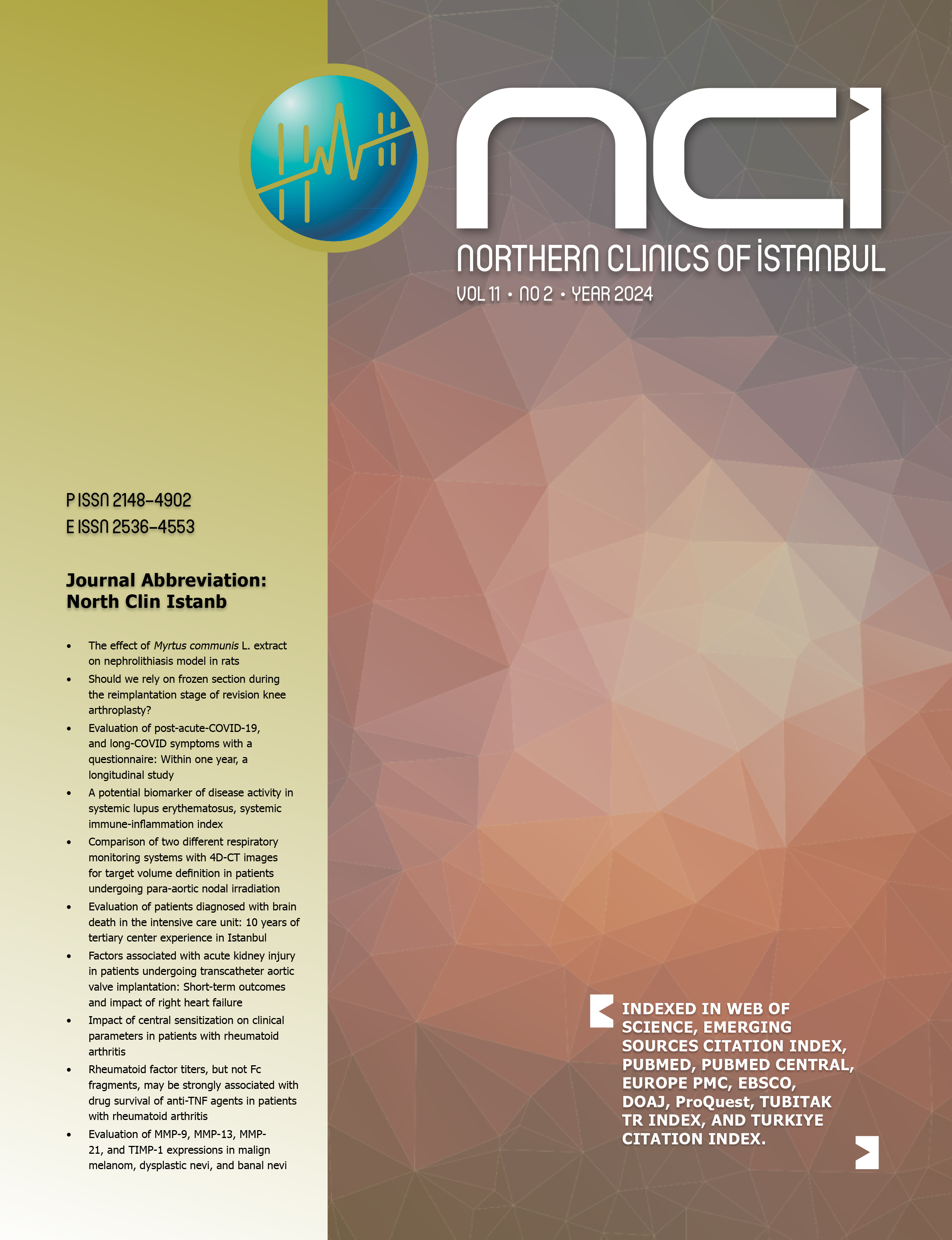Experimental investigation of the effect of thymoquinone on the viability of random patterned skin flaps
Gulsum Cebi1, Tugba Feryal Yildiz2, Eda Merve Kurtulus3, Yagmur Aydin4, Merdan Serin51Department of Plastic, Reconstructive and Aesthetic Surgery, Sisli Memorial Hospital, Istanbul, Turkiye2Private Practice, Plastic Surgery, Istanbul, Turkiye
3Department of Nutrition and Dietetics, Istanbul Gelisim University Faculty of Health Sciences, Istanbul, Turkiye
4Department of Plastic, Reconstructive and Aesthetic Surgery, Istanbul University-Cerrahpasa, Cerrahpasa Faculty of Medicine, Istanbul, Turkiye
5Department of Plastic, Reconstructive and Aesthetic Surgery, Istanbul Medeniyet University Faculty of Medicine, Istanbul, Turkiye
OBJECTIVE: The purpose of this study is to demonstrate the potential effects of thymoquinone, a well-known antioxidant agent, on random flap viability and thus to improve the clinical use of these flaps.
METHODS: In this study, 24 Sprague Dawley female albino rats weighing between 200250 grams were used. Three groups consisting of randomly selected 8 rats were formed, as study, sham and control groups. Modified McFarlane flap model sized 3x9 cm. was used. In control group, only local wound care was carried out for ten days after flap elevation. In sham group, daily intraperitoneal dimethyl sulfoxide (DMSO) solution was injected in the post-operative 10-day period. In the study group thymoquinone and DMSO solution were injected intraperitoneally together. 10 days later, the study was terminated and flaps were photographed for necrotic area measurements, tissue and blood samples were taken out for biochemical and histopathological studies. In biochemical studies, tissue and serum total antioxidant capacity (TAC) and thiobarbituric acid reactive substrates (TBARS) levels were measured. Histopathological studies included inflammatory cell infiltration, collagen, fibroblast formation and angiogenesis.
RESULTS: There was significant decrease in the necrotic areas of flaps in the study group. Serum and tissue antioxidant levels were significantly high and TBARS levels were significantly low. Histopathological examination showed no significant difference in inflammatory cell infiltration, fibroblast formation or angiogenesis between the groups. However, collagen density in the study group was found to be more than the other groups and the structure was better formed.
CONCLUSION: Thymoquinone increases the flap viability due to its antioxidant properties and it has a positive contribution to wound healing, although it has no significant anti-inflammatory or anjiogenetic activity. In the future, we think that it can be clinically useful for preventing distal flap necrosis in patients with high risk.
Keywords: Random flap; reconstructive surgery; thymoquinone.
Random paternli deri fleplerinin yaşayabilirliğinde timokinonun etkisinin deneysel olarak araştırılması
Gulsum Cebi1, Tugba Feryal Yildiz2, Eda Merve Kurtulus3, Yagmur Aydin4, Merdan Serin51Şişli Memorial Hastanesi, Plastik, Rekonstrüktif ve Estetik Cerrahi Kliniği, İstanbul2Özel Muayenehane, Plastik Cerrahi, İstanbul
3İstanbul Gelişim Üniversitesi Sağlık Bilimleri Fakültesi, Beslenme ve Diyetetik Bölümü, İstanbul
4İstanbul Üniversitesi-Cerrahpaşa, Cerrahpaşa Tıp Fakültesi, Plastik, Rekonstrüktif ve Estetik Cerrahi Anabilim Dalı, İstanbul
5İstanbul Medeniyet Üniversitesi Tıp Fakültesi, Plastik, Rekonstrüktif ve Estetik Cerrahi Anabilim Dalı, İstanbul
Giriş ve Amaç: Bu deneysel çalışmanın amacı antioksidan özelliği bilinen timokinonun random flep yaşayabilirliği üzerine olası etkilerini göstermek ve bu sayede bu fleplerin klinik kullanımını arttırmaktır.
Materyal ve Metod: Çalışmada ağırlıkları 200250 gram arası değişen 24 adet Sprague Dawley cinsi dişi albino sıçan kullanıldı. Kontrol, sham ve deney grubu olmak üzere rastgele seçilmiş 8er sıçandan oluşan 3 grup oluşturuldu. Sıçanlarda 3x9 cm.lik modifiye McFarlane flep modeli kullanıldı. Kontrol grubuna flep elevasyonu sonrası 10 gün boyunca sadece yara bakımı yapıldı. Sham grubundaki sıçanlara post operatif dönemde 10 gün boyunca intraperitoneal DMSO solüsyonu, deney grubuna 10 gün boyunca intraperioteal timokinon enjekte edildi. 10 gün sonra deney sonlandırılarak fleplerde alan ölçümü için fotoğraflama, biyokimyasal inceleme için serum ve doku, histopatolojik inceleme için doku örnekleri alındı. Fleplerde nekroz alanları, inflamatuar hücre, kollajen, fibroblast yoğunluğu, anjiogenez, serum ve doku total antioksidan kapasite ve tiyobarbitürik asit reaktif maddelerinin düzey ölçümleri yapıldı.
Bulgular: Deney grubunda nekroz alanlarında diğer gruplara göre anlamlı derecede azalma tespit edildi. Biyokimyasal incelemelerde serum ve doku örneklerinde total antioksidan kapasitede anlamlı artış ve tiyobarbitürik asit reaktif maddelerinde anlamlı azalma tespit edildi. Histopatolojik incelemelerde inflamatuar hücre düzeyinde, firoblast oluşumunda, anjiogenezde gruplar arasında anlamlı fark gözlenmedi. Deney grubunda kollajen yoğunluğu daha fazla ve kollajen yapısının daha düzenli olduğu görüldü.
Sonuç: Timokinonun antioksidan etkinlik göstererek flep yaşayabilirliğini arttırdığı ve anlamlı antiinflamatuar, anjiogenetik etki göstermemekle birlikte yara iyileşmesine olumlu katkı sağladığı çalışmamızda gösterilmiştir. Timokinonun gelecekte klinikte yükse riskli vakalarda distal flep nekrozunu azaltma amaçlı kullanılabileceğini düşünmekteyiz. (NCI-2024-6-6)
Anahtar Kelimeler: Random flep; rekonstrüktif cerrahi; timokinon.
Manuscript Language: English





















